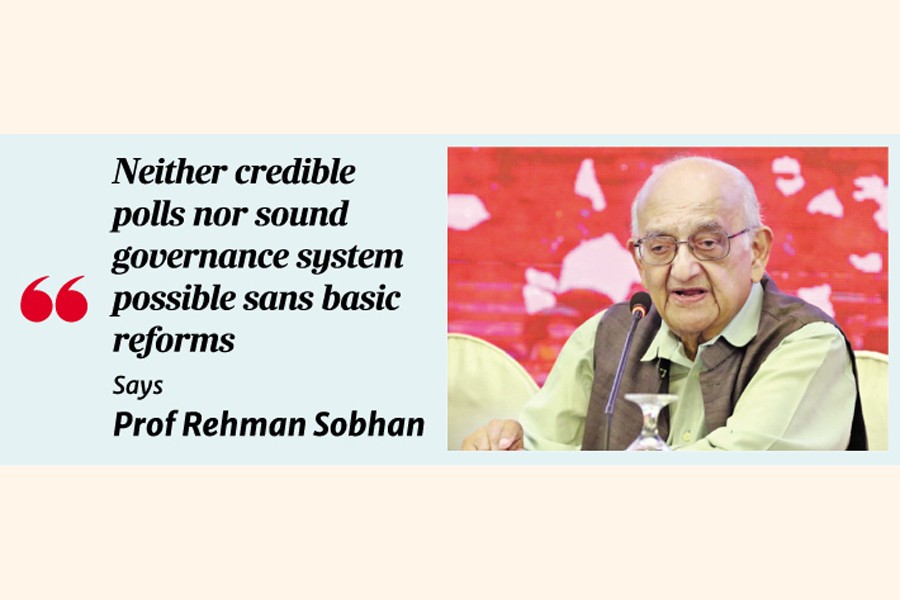
Published :
Updated :

Economists and elites deplored the stalling of the post-uprising interim government's reform agenda, despite months of pledges and discussions, as they grouped in a watchdog on reforms.
Bangladesh Reform Watch (BRW) was launched at a meet organised by the Citizens' Platform for SDGs in Dhaka on Monday, where the speakers vented deep frustrations over the dillydallying in reforms.
They alert that without clear priorities, citizen engagement and accountability, the much-hyped reform drive risks ending in failure like previous efforts.
Centre for Policy Dialogue (CPD) Chairman Prof Rehman Sobhan said the government still lacked clarity on what reforms were necessary and where they should begin, even after a year of debate.
He notes that over 150 reform proposals were initially floated, later cut to around 82, but no explanation was provided on how they were prioritised or to what end.
"With elections due in February, neither a credible poll nor a sound governance system will be possible without fundamental reforms," Sobhan warns.
Simply drafting proposals and collecting signatures from political parties, he argues, cannot be considered real reform.
Recalling his own involvement in preparing Bangabandhu's Six Points ahead of the Liberation War, he urges civil society to transcend fragmented initiatives and once again assume a transformative role.
Distinguished Fellow of the CPD Dr Debapriya Bhattacharya observed that the initial momentum for reform, generated after the interim government assumed office, largely evaporated.
"Bangladesh is going through a storm. The challenge now is to uphold the spirit of anti-discrimination of July and keep alive the aspiration for change. But the wave of reforms has disappeared," he told the meet.
Committees and commissions, he added, had reduced the process to political talk, leaving out marginalised and minority communities.
"Technical solutions cannot deliver reforms. Practical solutions are needed, and this is where the government is falling short," he remarked.
Another CPD Distinguished Fellow, Dr Mustafizur Rahman, drew parallels with the early 1990s when 29 taskforces were formed under Justice Shahabuddin but yielded little. "Reforms repeatedly collapse because they are decided without public participation," he said.
Executive Director of SANEM Prof Selim Raihan said the drive petered out after December 2024 as anti-reform forces gained influence within the administration.
"A few steps have been taken, but nothing substantial. This has raised doubts about the state's capacity to carry out reforms," he observed.
Economist and PPRC Chairman Hossain Zillur Rahman criticised the government for confining reforms to 11 commissions, ignoring citizens' core expectations for freedom from authoritarianism, inclusive social policies and everyday welfare.
"People were missing from the government's calculations. They raised expectations but then went to sleep," he told the BRW-launching function.
Echoing the sense of disillusionment, former Jahangirnagar University economics professor Anu Muhammad said inequality, unemployment and violence found a spurt even as the rhetoric of reform has intensified. "The state keeps citizens under constant surveillance, but it is time for citizens to place the government under scrutiny," he added.
Opening the event, CPD Additional Research Director Towfiqul Islam Khan announced that the Citizens' Platform would develop a people-centred manifesto to align political parties' agenda with citizens' aspirations.
The Citizen's Platform formally launched BRW to track the progress in reforms promised in the wake of the July mass uprising. The initiative aims to evaluate measures taken during the remainder of the interim government's tenure, monitor electoral commitments in the run-up to the February 2026 polls, and assess reform implementation under the next elected government.
The platform says BRW will examine reforms across a wide range of areas, including public financial management, capital markets, banking and finance, energy transition and security, public services, labour rights, social protection, education, health, agriculture, land management, LDC graduation, gender equality, media freedom, human rights and data governance.
It will also evaluate the feasibility of financing reforms and the institutional capacity of government agencies, while ensuring that the voices of marginalised communities are reflected.
More than 150 organisations from across civil society, along with private-sector leaders and professional groups, are participating in the collaborative initiative.
Debapriya Bhattacharya, convener of the Citizens' Platform, stressed that no reform initiative can be meaningful or sustainable without active citizen engagement.
"BRW will monitor both the implementation and the progress of the government's reform measures," said the economist, who headed a panel appointed by this interim government to prepare a white paper on the entire spectrum of the economy under the previous government unseated through the uprising.
bdsmile@gmail.com


 For all latest news, follow The Financial Express Google News channel.
For all latest news, follow The Financial Express Google News channel.